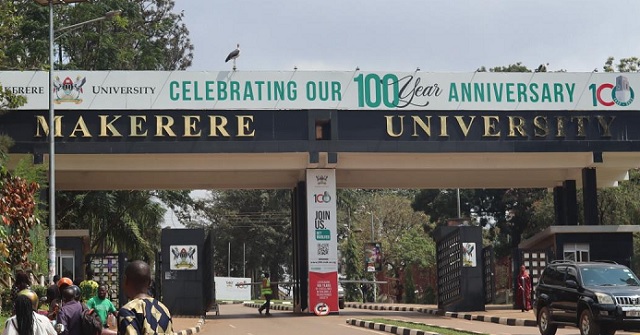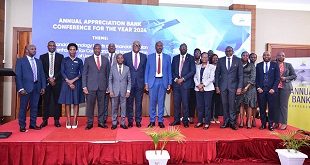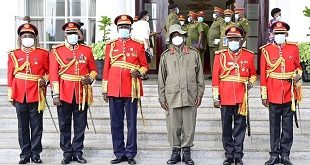
Kampala, Uganda | THE INDEPENDENT | On Tuesday, Agatha Ayebazibwe, a Master’s student of Strategic and Corporate Communication at Makerere University, found her right-side mirror missing. Ayebazibwe had parked in front of the College of Humanities and Social Sciences (CHUSS) to attend lectures, which typically last no more than four hours.
Unfortunately, she had not been informed about the prevalence of criminal activity on campus, where malicious individuals frequently target the university community. Ayebazibwe became a victim of the growing security challenges at Uganda’s oldest academic institution.
CHUSS is situated just a few meters away from Frank Kalimuzo CTF 1, which houses various management offices, including that of the Vice-Chancellor. One might assume that being in close proximity to such a prominent structure would ensure a degree of safety. However, the reality was different.
Ayebazibwe’s friends advised her, “So sorry, Agatha, please always park at CTF parking; that is the only safe place.” Ayebazibwe’s case is not isolated. A few months ago, Baker Batte, a student pursuing a PhD at Makerere University Institute of Social Research (MISR), reported a similar incident where thieves made off with his side mirror. Batte had parked his car in the MISR parking lot, an area typically monitored by a security guard. Unfortunately, on that day, the guard failed to detect the theft.
While these incidents may seem minor, Kizito Vianney Sydney, a recent graduate from the Department of Journalism and Communication, experienced a more substantial loss. During his final year, Kizito purchased a motorcycle for commuting to and from campus. One day, after parking his motorcycle outside the Department of Journalism and Communication to attend a lecture, he returned to find it had been stolen. Despite his efforts to report the theft to the police, no progress was made in recovering his motorcycle, and he had to come to terms with the loss.
These cases represent just a few examples of security issues that have plagued Makerere University’s campus for an extended period. While we couldn’t obtain the current crime statistics, a report from the Makerere University Police Post in 2017 indicated that, on average, 14 motorcycles were stolen from Makerere University every year. During that time, a total of 56 motorcycles belonging to students and staff were taken from Makerere University, and none had been recovered.
The report further revealed that between 2013 and 2016, a total of 178 laptop computers were stolen from students and staff. Additionally, several incidents of stolen mobile phones, burglaries, and stolen car parts were reported during the same period. Last year, Mary Stuart, one of the girls’ halls of residence at Makerere, experienced a surge in theft cases, prompting university management to deploy a full-time armed guard to secure the premises. Many students attributed the increase in theft to the closure of Lumumba Hall, a men’s hall of residence, which had acted as a deterrent to criminals. This led to the management deploying an armed guard to ensure security.
The challenges in campus security have several contributing factors. In a previous interview with URN, the Vice-Chancellor, Prof. Barnabas Nawangwe, mentioned that the university had decided to limit entry and exit points once the construction of the university’s perimeter wall was completed. This is one of the measures aimed at improving the safety and security of students, staff, and visitors. Makerere University had previously had multiple unmanned entrance and exit points for an extended period.
Previously, the university had three official entry and exit points: The Main, Western, and Eastern gates. However, there were at least five other smaller gates around the university that were often unmanned and lacked adequate lighting at night. These included gates near Wandegeya, the College of Veterinary Medicine, Animal Resources, and Biosecurity (COVAB), one close to the Western Gate leading to Kikoni, one near the main playground, and another adjacent to Makerere College School.
Additionally, there were several unauthorized pathways created by students and staff, enabling individuals, including those with malicious intentions, to enter and exit the campus without undergoing security checks. As the construction of the perimeter wall nears completion, access to the university has been limited to three main entrances: the main gate, the eastern gate, and the western gate.
However, two pedestrian entry points, one in Wandegeya near University Hall and the other adjacent to the Rugby grounds in “Kikumi kikumi,” remain open 24 hours a day, without closing gates. Even when there are security personnel present, comprehensive security checks appear to be lacking. Although there is a security presence at the three official gates, their primary focus seems to be on checking for parking stickers or collecting fees from vehicles without stickers, rather than conducting thorough security checks. Our reporter attempted to contact the known University Chief Security Officer, Cyrus Omara but was informed that he had left the university.
The reporter was referred to his successor, Michael Munsan, who is the current Chief Security Officer. Munsan stated that he needed time to analyze and understand the causes of the security challenges since he had only recently taken up the position. “I’m just four days in office, I need to analyze and find out what could be the causes, and since I have been there, I have not heard something reported of such, but I need to analyze the crime patterns and trends,” he told our reporter.
An anonymous security officer within the university’s security circles revealed that while security operatives have tried to apprehend suspected thieves on campus, they have often been frustrated by the LDC court, which releases them, claiming that Makerere is a public university open to everyone. “But if a person does not know where they are going and they are just gambling, that means they are criminals making their plans,” the security officer said. The same source emphasized that the current security personnel are insufficient to effectively monitor the entire campus due to its vast size.
They highlighted that securing Makerere University requires a considerable number of security personnel. “By the way, securing Makerere needs a battalion, do you know how many people are in a battalion? 1000 soldiers to secure Makerere, because it is on more than 300 acres of land, and because of the manpower, people are working day and night to make sure there is security,” the security officer said.
*****
URN
 The Independent Uganda: You get the Truth we Pay the Price
The Independent Uganda: You get the Truth we Pay the Price


